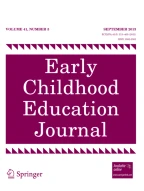Abstract
Coding is defined as the “process of assigning a code (command/rule)” (http://Techopedia.com) that allows a machine or a person to act or move (McLennan, https://www.naeyc.org/resources/pubs/tyc/feb2017/creating-coding-stories-and-games, 2017). Though machines operated by a coding system are common in children’s everyday lives, there has been a lack of resources on how to expose young children to coding in a developmentally appropriate manner. This paper aims to address this gap in the field of early education by providing developmentally appropriate guidelines for teachers of young children to utilize when implementing coding in their classrooms. Specifically, this paper focuses on unplugged coding activities that do not involve computers or computer programming and presents practical examples of tasks with algorithm designs, including a detailed step-by-step instruction set for solving a problem or completing a task (Tynker, https://www.tynker.com/blog/articles/ideas-and-tips/how-to-explain-algorithms-to-kids/, 2019). This paper presents coding practices that involve children’s daily lives, incorporating sequential and directional commands and coding grids (coding sheet).
Similar content being viewed by others
Change history
07 September 2019
The original version of this article unfortunately contained a typo in the co-author name. The author name should be Jo Junoh instead it is published incorrectly as Jo Junho. The original article has been corrected.
References
Albo-Canals, J., BarcoMartelo, A., Relkin, E., Hannon, D., Heerink, M., Heinemann, M., et al. (2018). A pilot study of the KIBO robot in children with severe ASD. International Journal of Social Robotics, 10(3), 371–383.
Ananiadou, K., & Claro, M. (2009). 21st century skills and competences for new millennium learners in OECD countries. OECD Education Working Papers, No. 41, OECD Publishing. https://doi.org/10.1787/218525261154.
Bell, T., Witten, I. H., & Fellows, M. (1998). Computer science unplugged…off-line activities and games for all ages. Retrieved August 12, 2019 from https://classic.csunplugged.org/wp-content/uploads/2015/01/unplugged-book-v1.pdf.
Bers, M. U. (2012). Designing digital experiences for positive youth development: From playpen to playground. Cary, NC: Oxford.
Bers, M. U. (2018a). Coding as a literacy for the 21st century. Education Week. Retrieved August 12, 2019 from https://blogs.edweek.org/edweek/education_futures/2018/01/coding_as_a_literacy_for_the_21st_century.html.
Bers, M. U. (2018b). Coding, playgrounds and literacy in early childhood education. Paper presented at the IEEE Global Engineering Education Conference (EDUCON). Retrieved August 12, 2019 from https://sites.tufts.edu/devtech/files/2018/05/EDUCON.pdf.
Campbell, C., & Walsh, C. (2017). Introducing the “new” digital literacy of coding in the early years. Practical Literacy: The Early and Primary Years, 22(3), 10–12.
Fleer, M. (2013). Play in the early years. Port Melbourne, VIC: Cambridge University Press.
Heikkila, M., & Mannila, L. (2018). Debugging in programming as a multimodal practice in early childhood education settings. Multimodal Technologies and Interactions, 2(3), 42. https://doi.org/10.3390/mti2030042.
Lee, J. (2016). How to teach math to children (2nd ed.). San Diego, CA: Cognella.
Lee, J. (2019). Coding in early childhood. Contemporary Issues in Early Childhood. https://doi.org/10.1177/1463949119846541.
Lestch, C. (2018). These states embraced computer science education in 2017. Retrieved August 12, 2019 from https://edscoop.com/these-states-embraced-computer-science-education-in-2017/.
McLennan, D. P. (2017). Creating coding stories and games. Teaching Young Children, 10(3). Retrieved August 12, 2019 from https://www.naeyc.org/resources/pubs/tyc/feb2017/creating-coding-stories-and-games.
National Association for the Education of Young Children, & Fred Rogers Center for Early Learning and Children’s at Saint Vincent College. (2012). Retrieved August 12, 2019 from Technology and interactive media as tools in early childhood programs serving children from birth through age 8. https://www.naeyc.org/sites/default/files/globally-shared/downloads/PDFs/resources/topics/PS_technology_WEB.pdf.
Partnership for 21st Skills. (2009). P21 Framework definitions. Retrieved August 12, 2019 from https://files.eric.ed.gov/fulltext/ED519462.pdf.
Ricketts, R. (2018). Computational thinking for kindergarteners. Retrieved August 12, 2019 from https://www.edutopia.org/article/computational-thinking-kindergartners.
Techopedia.com. (n.d.). Coding. Retrieved August 12, 2019 from https://www.techopedia.com/definition/6535/coding.
Tynker. (2019). How to explain algorithms to kids. Retrieved March 24, 2019 from https://www.tynker.com/blog/articles/ideas-and-tips/how-to-explain-algorithms-to-kids/.
Vallori, A. B. (2014). Meaningful learning in practice. Journal of Education and Human Development. https://doi.org/10.15640/jehd.v3n4a18.
Author information
Authors and Affiliations
Corresponding author
Additional information
Publisher's Note
Springer Nature remains neutral with regard to jurisdictional claims in published maps and institutional affiliations.
The original article was revised: The typo in author name was corrected.
Rights and permissions
About this article
Cite this article
Lee, J., Junoh, J. Implementing Unplugged Coding Activities in Early Childhood Classrooms. Early Childhood Educ J 47, 709–716 (2019). https://doi.org/10.1007/s10643-019-00967-z
Published:
Issue Date:
DOI: https://doi.org/10.1007/s10643-019-00967-z
